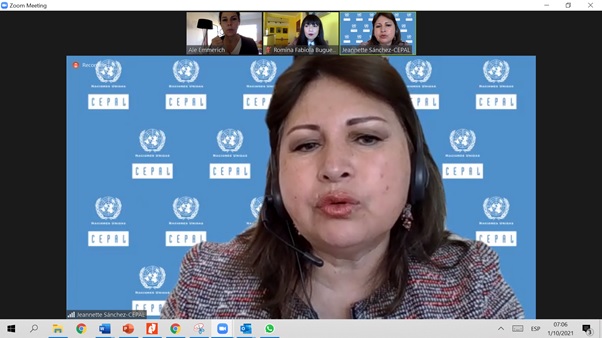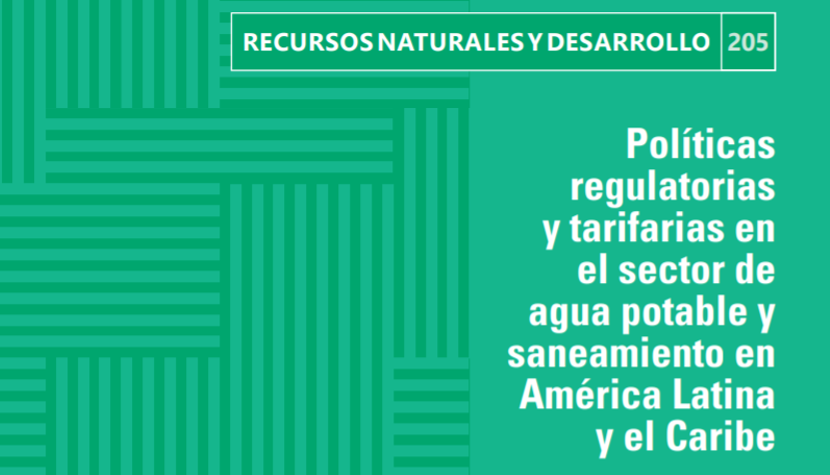ECLAC participates in the meeting "Dialogues of the Present" - Chilean Sustainability Week - Panel 1 "Water and Biodiversity"
Work area(s)
Teaser
The second edition of the Dialogues of the Present Meeting, in the Chilean Sustainability Week, organized by the civil society "Fundación Diálogo del Presente", in virtual form, saw its opening remarks by Dr Jeannette Sánchez, Director of the ECLAC Natural Resources Division, in panel one on Water and Biodiversity.
Event information

Date
1 Oct 2021, 07:00 - 08:00Event type
Last Friday, October 1, the second edition of the Dialogues of the Present Meeting took place, exploring Sustainable Development and Circular Economy as well as life in the fullness of various Chilean communities, specifically in the Fifth Region of Valparaíso, organized by the civil society "Fundación Diálogo del Presente". During the seminar, organized to connect key actors to design, plan and specify a roadmap of sustainable, efficient and circular solutions to supply the water scarcity in the Valparaíso Region, the related challenges and good practices were discussed. The discussion touched upon topics including regulatory framework, the integrated management of the watersheds and the search for new sources of water, all of which placing human consumption and the protection of ecosystems as a central priority. Representatives of the public sector at the regional and municipal level, international and non-governmental organizations, and the academic world attended the event.
Panel 1 of the event, called "Water and Biodiversity", included the inauguration of Jeannette Sánchez, Director of the Natural Resources Division of ECLAC. Sánchez presented a diagnosis of the current situation at the regional and national level in Chile, and the need for a sustainable and inclusive water transition, highlighting the notable progress made in Chile in water matters in recent years and its position as a leader in Latin America and the Caribbean, taking into account that it still has to face significant gaps for the fulfilment of SDG 6. In addition, data-based arguments were presented to evidence the great challenge of water management in all the country's regions and showed that Chile is among the 30 countries with the highest water risk in the world.
Sánchez also commented on the interrelation between water and biodiversity and the importance of terrestrial ecosystems and forests to regulate the water cycle and dampen extreme climatic phenomena. She highlighted the value of nature-based solutions and the possibilities that green urban infrastructure allows with positive results regarding water availability, water quality and flood reduction.
Finally, Sánchez proposed recommendations from ECLAC within the framework of the great drive for sustainability, promoting the constitutional recognition of the Human Right to Water and Sanitation, consecrating water resources as a national asset for public use, and finally, strengthening governance systems as the basis of an integrated water resources management system that includes all sectors, institutions, civil society actors and the private sector in its planning.
Related content

ECLAC participated in the 9th Session of Meeting of the Parties to the Water Convention
Silvia Saravia-Matus, Economic Affairs Officer of the Natural Resources Division, participated in the Meeting of the Parties, the main governing body of the Convention on the Protection and Use of…

Estado actual de la regulación y las tarifas aplicadas en agua y saneamiento en diez países de América Latina y el principal prestador de los servicios en cada uno de ellos
La División de Recursos Naturales (DRN) de la Comisión Económica para América Latina y el Caribe (CEPAL) ha publicado el documento “Políticas regulatorias y tarifarias en el sector de agua potable y…

Water dialogues in Latin America and the Caribbean to accelerate SDG 6
More than 3000 people from different social, economic, and environmental sectors in the region registered for the virtual event co-organized by ECLAC, UNESCO IHP, CONAGUA and the Federal Government…